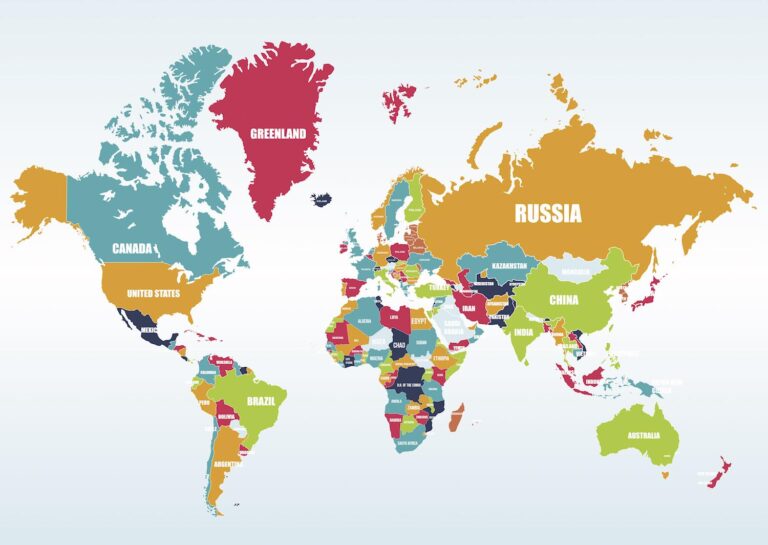In a development affecting international mail and global communication, a newly released map reveals the growing number of countries suspending postal services to the United States. This disruption, driven by a variety of logistical and regulatory challenges, highlights mounting obstacles in cross-border mail delivery amidst evolving geopolitical and pandemic-related pressures. The comprehensive visual representation, featured in Newsweek’s latest report, underscores the widespread nature of these suspensions and offers critical insight into the implications for businesses, individuals, and governments relying on international postal networks.
Countries Halting Postal Deliveries to United States and Their Reasons
Multiple nations have recently decided to suspend their postal services to the United States, citing a variety of logistical and political challenges. Among the most prominent reasons are ongoing disruptions in international shipping networks and increased security concerns amid rising geopolitical tensions. Countries such as Brazil, India, and South Africa have explicitly mentioned the inability to guarantee timely and secure delivery, forcing them to halt mail exchanges. Additionally, some governments have raised alarms about the growing costs associated with handling outbound parcels during the pandemic recovery phase, which has further strained resources.
The implications of these suspensions extend beyond simple delays, affecting businesses, individual correspondences, and even diplomatic communications. The list below summarizes key countries with halted mail services to the U.S. and the primary factors influencing their decisions:
- Brazil: Pandemic-related logistical bottlenecks and increased customs inspections.
- India: High operational costs coupled with parcel security concerns.
- South Africa: Postal infrastructure challenges and delayed air freight connections.
- Turkey: Political diplomatic strains impacting international agreements.
| Country | Reason for Suspension | Expected Resolution Timeline |
|---|---|---|
| Brazil | Logistical delays due to pandemic | 6 months |
| India | Security and cost concerns | 3-4 months |
| South Africa | Freight and infrastructure delays | Undetermined |
| Turkey | Political reasons | Pending diplomatic talks |
Impact on International Shipping and E-commerce Between Affected Nations and the US
The suspension of postal services by multiple countries to the United States has created significant disruptions in international shipping and e-commerce transactions. Businesses relying on cross-border shipping face delayed deliveries, increased costs, and the challenge of finding alternative logistics solutions. The ripple effects are especially pronounced for small to medium-sized enterprises (SMEs) that depend on affordable postal services to maintain competitive pricing and timely customer fulfillment. As a result, consumers in the US are experiencing longer wait times for international packages, impacting overall satisfaction and trust in global online marketplaces.
Key consequences emerging from these service suspensions include:
- Rerouting of packages through private courier companies, often at higher fees
- Increased customs processing times and complexities due to alternative shipping routes
- Reduction in product availability and variety due to logistical constraints
- Heightened operational costs for online retailers leading to potential price hikes
| Country | Suspension Start | Primary Alternatives | Impact Level |
|---|---|---|---|
| Country A | March 2024 | Private Couriers, Air Freight | High |
| Country B | February 2024 | Express Delivery Services | Moderate |
| Country C | April 2024 | Sea Freight, Third-party Logistics | High |
Strategies for Businesses and Consumers Navigating Postal Service Suspensions
Businesses facing postal service suspensions must adopt multifaceted approaches to maintain supply chain integrity and customer satisfaction. Diversifying shipping options is critical. Companies are advised to:
- Partner with multiple international couriers to mitigate single-channel disruptions.
- Invest in digital delivery methods, especially for products that can be virtualized or replicated digitally.
- Communicate proactively with clients, setting realistic expectations on possible delays and alternative delivery timelines.
Consumers, on the other hand, can take immediate action to minimize inconvenience. Prioritizing informed purchasing and understanding new shipping landscapes are key strategies. Some practical steps include:
- Verifying updated postal status maps and choosing sellers from countries with active shipment routes.
- Opting for express or tracked international shipping when available.
- Utilizing local warehouses or fulfillment centers that handle cross-border deliveries to the U.S.
| Strategy | Businesses | Consumers |
|---|---|---|
| Shipping Alternatives | Multi-courier partnerships | Express/tracked shipments |
| Communication | Proactive client updates | Review seller shipping policies |
| Supply Chain | Leverage regional warehouses | Purchase from active-region vendors |
The Conclusion
As international postal disruptions continue to affect communication and commerce, the evolving landscape of global mail services underscores the broader challenges facing international relations and logistics. Monitoring these developments remains essential for individuals and businesses reliant on transnational correspondence. Newsweek will keep tracking updates as countries adjust their postal policies to the United States amid ongoing geopolitical and health considerations.




